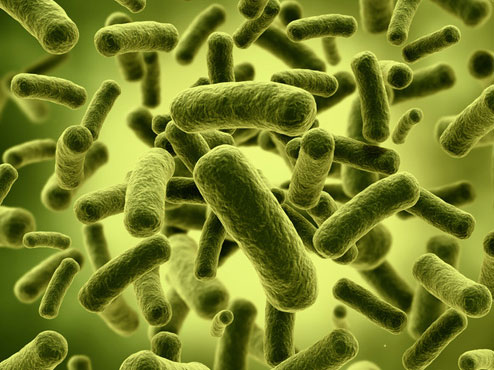(单词翻译:单击)
听力文本
This is Scientific American — 60-Second Science. I'm Christopher Intagliata.
Got a minute?
You are what you eat, the old expression goes. But it leaves out one crucial detail. "We don't dine alone. We dine with trillions of friends." Jeff Gordon, a microbiologist at Washington University in Saint Louis. "And they are partners in consuming these meals and ingredients."
Those friends—they're microbes in our guts. They break down dinner, including otherwise indigestible stuff, and pass the leftovers on to more microbes. Creating a complex food web inside us.
But that microbial garden is a lot more diverse in people who eat a calorie-restricted, veggie-rich diet. The typical American diet on the other hand—breads, meat, cheese, not a lot of veggies—doesn't raise up near as diverse a crop of microbes.
And microbial diversity matters. Because in a mouse model, Gordon's team found that, if you give up the American diet, in favor of a healthier one with lots of veggies—the "Americanized" gut bacteria, being less diverse, aren't primed to respond. They're not great at regrouping, to accommodate all the nutrients in kale and broccoli and so on. The study is in the journal Cell Host & Microbe.

All this isn't to say you shouldn't try to eat healthier. Because it's not clear how this microbial efficiency translates into human health. Or to what extent you might be able to pick up beneficial microbes from those around you, as they demonstrated mice can, in this study. But Gordon's colleague Nick Griffin had this prediction: "It's entirely possible that in the future we'll more and more recognize a need to reinstall absent populations of bacteria in people as they're looking to change their diet for benefits to health."
Until then—next time you're about to fertilize your microbial flora with a patty melt—you might just wanna do a gut check first.
Thanks for the minute for Scientific American — 60-Second Science Science. I'm Jason Goldman.
参考译文
这里是科学美国人——60秒科学。我是克里斯托弗·因塔利亚塔。
有一分钟时间吗?
俗话说:人如其食。但是,这句话漏掉了一个关键的细节。“我们并不是单独用餐。我们和数万亿的朋友一起用餐。”杰夫·戈登是华盛顿大学圣路易斯分校的微生物学家。“它们和我们一起在消费这些食物和原料。”
这些朋友就是我们肠道里的微生物。这些微生物分解晚餐,包括一些难以消化的食物,并将剩饭剩菜传给更多的微生物。这就在我们的体内创造了一个复杂的食物网。
但是,对于那些在饮食上限制热量并以素食为主的人来说,他们体内的微生物花园会更加的多样化。另一方面,面包、肉类和奶酪是典型的美国饮食,而这类饮食的蔬菜量不太丰富,它们不会提升人体内微生物的多样性。
微生物多样性具有重要的作用。因为戈登团队在老鼠模型中发现,如果放弃传统的美国饮食,转而选择更健康且以素食为主的食物,那“美国化”肠道细菌的多样性就会减少,而且也没有为处理蔬菜食物做好准备。这些美国化的肠道细菌并不擅长为适应甘蓝和椰花菜等蔬菜中的营养物质而进行重组。这一研究结果发表在《细胞宿主和微生物》期刊上。
这并不是说我们不应该吃更健康的食物。因为目前尚不清楚这些微生物效能如何转化成人体健康。或者说,在何种程度上人体能从周围环境获得有益的微生物,就像研究人员在这项研究中证实老鼠可以做到的那样。但是,戈登的同事尼克·格里芬曾预测说,“在未来非常有可能的是,我们会更清晰地认识到补充人体所缺乏细菌的必要性,因为人们会为了健康而改变饮食。”
在那之前,下次你打算用小肉饼增加微生物菌群时,你可能会想先做一下肠道检查。
谢谢大家收听科学美国人——60秒科学。我是杰森·古德曼。
译文为可可英语翻译,未经授权请勿转载!
重点讲解
重点讲解:
1. leave out 排除;不包括;
例句:Don't leave out the definite article.
这里不要漏掉定冠词。
2. break down (使)(物质)分解;
例句:Sugar and starch are broken down in the stomach.
糖和淀粉在胃里被分解。
3. give up 放弃;戒除;
例句:The priest persuaded him to give up his bad habit.
牧师劝他放弃坏习惯。
4. in favor of 支持;赞成;
例句:That's why I am not in favor of the plan.
那就是我不赞成这计划的原因。
5. and so on 及诸如此类;等等;
例句:We may also divide the screen into quarters, sixths, and so on.
我们亦可把屏幕划分为四等分、六等分等等。


